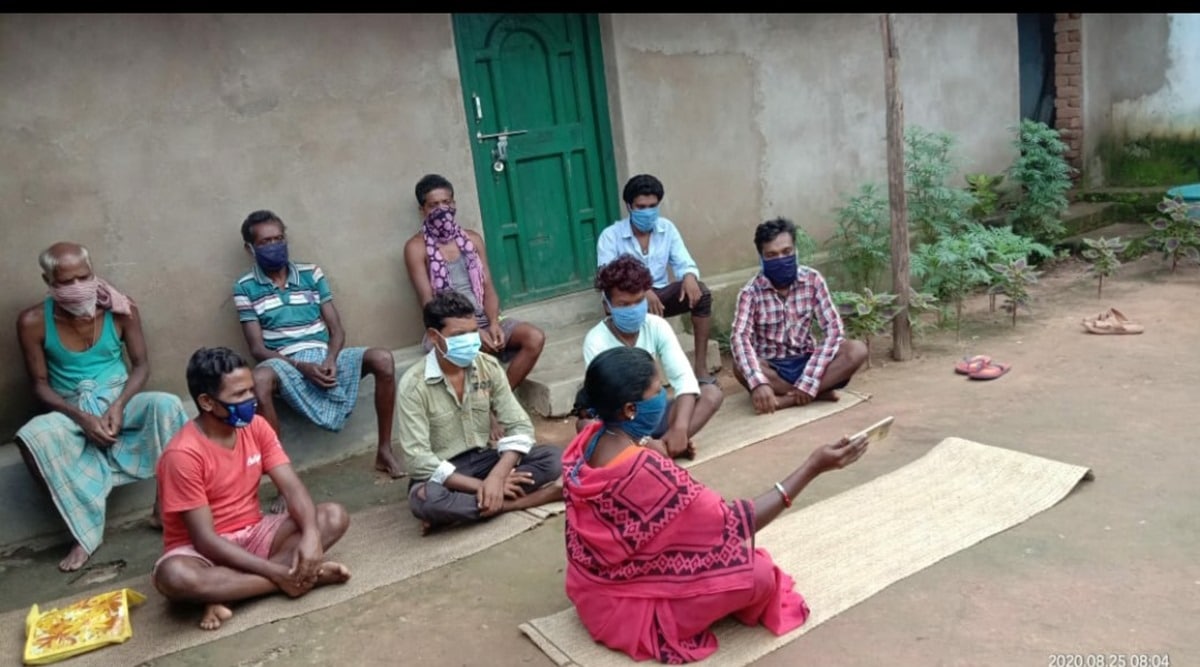 In just four months, according to Sahu, Yadav and the officers, they could see remarkable changes in the attitudes of parents towards their children. (Photo by: Ashish Kale)
In just four months, according to Sahu, Yadav and the officers, they could see remarkable changes in the attitudes of parents towards their children. (Photo by: Ashish Kale)Rajkumari Yadav (48) has been an anganwadi sevika in Chhattisgarh for 21 years. In her over two decades of experience, she has never had to remain away from the children who came to her anganwadi. But since the nationwide lockdown came into effect in March, all anganwadis were shut, and now Yadav sees the children only during the home visits she makes, in Mungeli district of Chhattisgarh.
“Children wait eagerly to meet me. During every home visit, they ask when they can return to the anganwadi… ,” Yadav told The Indian Express on the phone, from Karupaan village in Mungeli district.
She is among the thousands of frontline anganwadi sevikas visiting homes located in remote areas of Chhattisgarh and Bihar. Armed with mobile phones loaded with a special audio message not meant for children, but for their parents, Yadav has been going door-to-door, engaging them with lessons on “lockdown parenting”, as part of an initiative called ‘Sajag’.
Launched in Chhattisgarh in April this year, ‘Sajag’ is a unique programme designed with audio messages aimed at tweaking parenting skills for the current climate of distress, uncertainty, job losses and prolonged home confinement. The short audio messages encourage parents to maintain healthy relations with their children and maintain a peaceful environment at home.
Teams at the Centre for Learning Resources (CLR), a Pune-based NGO, would relay specially-crafted audio messages in Hindi through the teams of Integrated Child Development Services (ICDS). A message is sent from the regional or district-level officer, which is then relayed to programme officers, supervisors and finally to the anganwadi sevikas, either via WhatsApp or Bluetooth, once a week.
Supported by the Ministry of Women and Child Development and UNICEF, the initiative was also expanded to Gaya and Purnia districts in Bihar, before its state-wide launch earlier this week.
“Since the lockdown began, families have remained under distress, with limited food supplies or crippled finances. The closure of anganwadis kept children at home. That is why the intervention was rolled out almost immediately, targeting parents,” said Chittaranjan Kaul, director of CLR, who has done the voice-overs in the audio tutorials.
Getting parents and the elders in a family to sit together was a task in itself, shared Yadav, who visits five to six homes every day in the village, between 10 am and 2 pm.
“The homes in my locality are composed of joint families, where children live with their parents, grandparents, uncles, aunts and other members. At times, the men would be out for some work, and then I explain the messages to the mothers and grandparents,” she said.
For another anganwadi sevika, Hemalata Sahu (42) from Kareli village in Chhattisgarh’s Dhamtari district, the popular use of WhatsApp lessened her burden in information dissemination to some extent. “I created groups of parents so that the audio messages could be sent at once,” said Sahu, whose anganwadi has 25 children.
But the challenges she faced were of a different kind. “It was difficult to keep track and know if the message was seen by the parents. So, during home visits, I would again play the messages,” said Sahu.
In the Naxal-affected, underdeveloped district of Dantewada, which has a sizable tribal population, the anganwadi teams had to rely more on frequent and personal interactions with parents over the use of technology.
“Often, when the elders are upset, the victims of their outburst and anger are the young children, who are already anxious. After this programme, parents now say they try to control their acts and behave responsibly,” said Bijendra Thakur, a district-level officer from Dantewada district.
He added, “The tribal families here have distinct cultural practices and beliefs. They prefer home visits”.
Covid-19 restrictions also meant that these tutorials were often held under a tree or at the courtyard in front of the houses.
Besant Minj, who heads anganwadi activities in Chhattisgarh’s Surajpur district, part of Sarjuga division, said his teams initially found the Hindi messages strenuous to translate.
“The supervisors and sevikas were trained, and asked to understand the meaning first, before sharing it in commonly-spoken local dialects like Surgujiya,” said Minj. The volunteers also used the home visits, meant for ration distribution, to play out the messages.
But there have been other hurdles: not all sevikas owned smartphones and internet connectivity was often weak, said Muktanand Khute, who also works in the Sarjuga division.
In just four months, according to Sahu, Yadav and the officers, they could see remarkable changes in the attitudes of parents towards their children.
“Some elders reported that they remained so engrossed with their daily schedule and work that they would hardly interact with their children. Parents, especially the fathers, shared that the messages have been eye-openers. Now, one parent ensures to stay home and care for the children when the other parent is away,” said Sahu, who sometimes schedules home visits during late afternoon hours of the day, to catch up with the male folk of the house.
Echoing similar sentiments, Minj said, “The parents have slowly begun to accept that some aspects regarding parenting have remained ignored. They reported that they were speaking and listening more to their child in the recent months.”